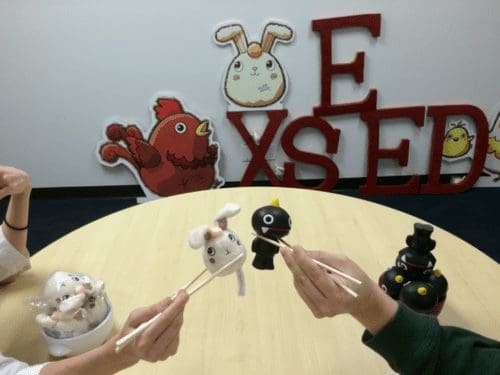
Now that we’re just about done with Story of Seasons, we’ve got a little time to take a few pictures. Below there is Nick, one of the game’s three main localizers, and Jess, ex-XSEED’s baroness of bacon, posing with some samples of our pocket plushies (which also gives you an idea of how “pocket” they are).

At this point, pretty much all that’s left is to move the restof the plushies through customs, have the packaging mass produced, and geteverything all put together and shipped. We’ll have a release date announced very soon.
Coming to the end of a big project like this makes me think back to the start of it all, back when the talks to take on the project began. Even then, over a year ago now, we had an idea of how huge it was going to be. The game’s combined script has over 1.3 million Japanese characters’ worth of text, and playing through to reach the endgame with just one of the twelve love interests takes as many as 100 hours. Being a small company, we weren’t always sure if we had the resources to tackle the whole thing, but I’m glad we did – not just because I’ve enjoyed the project, but because of what the series means to me.

My first Bokujou Monogatari-related experience dates back to before the first game’s release in the States. My friend Will and I had a running inside joke about imagining everything we saw as a video game, and when we read The Good Earth as part of a school assignment, we laughed at the idea of a video game about farming. When the game came out a year later, we were cynical. (About everything. We were 18.) But we read the reviews, poked around on the proto-internet, and found that pretty much everyone had good things to say.
I didn’t get to play the first game at the time; this was back when getting a new game was a major event, a far cry from nowadays, when anyone with a few bucks and an internet connection can grab just about any game on a whim. But the concept of the game stuck with me, and a few years later, when I had a PS1 and a little disposable income, I picked up the then-newest entry in the series and gave it a shot.
I knew nothing about farming when I started out. Like, less than nothing. I didn’t get that I had to till the soil before I planted the seeds. I threw seeds on the ground, killed them with a hoe, and spent the next two in-game weeks watering their corpses and wondering when they’d start sprouting. When I finally figured it out, and recorded my progress in the game diary that night, I imagined my guy writing, “Dear diary, I am a dumbass.”

But piece by piece, everything clicked for me, and as my little farm started growing, I found myself exploring the town and getting to know the people. By the standards of the time especially, the game’s town had an amazing level of detail and care put into it. Never before had I played a game where each individual character had his or her own routine, relationships, likes, dislikes and opinion of the player character, among all their other memorable quirks. Between that and all the various events and holidays, the town felt like a real community, a place I could always visit to relax and unwind.
More than that, the game was a place where hard work always paid off, where you were free to do that work at your own pace, and where everything made sense. It’s pleasant and comfortable, a breath of fresh air for those times in our lives when we need one.

Over the years, I’d continue coming back to the series, especially when my little brothers grew old enough to count. By then, I had one of the series’ PS2 games, and I used it to help teach them math, basic economics and responsibility. Once my own kids get a little older, I plan to do the same with them.
Besides that, one of my oldest friends, a guy who started in the industry on the same day and in the same place that I did, went on to become the series’ main localizer for a time. For about half a dozen back-to-back projects, he plugged away at those mammoth Japanese scripts, sometimes pulling double duty as the sole localizer and QA guy. I’d see the results of his work from the player’s side, but only now, after wrestling with the new game’s script for months and months with just a few fellow localizers alongside, do I fully appreciate how much work goes into any game like this, and I just hope we’ve done the series justice.

It’s been an honor and a privilege to have had a small hand in a series I’ve loved for years. As I head back to working on traditional RPGs and racy brawlers, I look forward to playing Story of Seasons at home, when I’ll have a chance to revisit Oak Tree Town like it’s the first time all over again.
– Ryan


